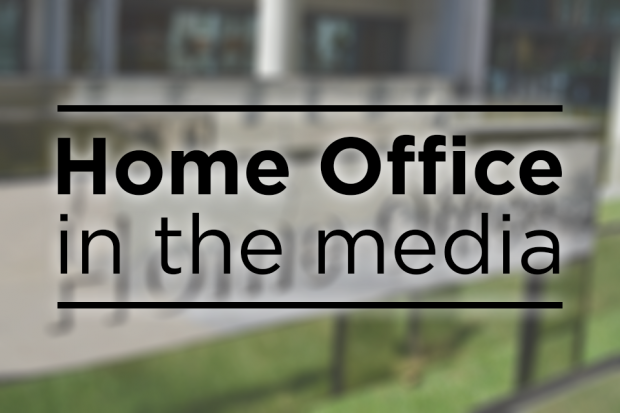
Today’s Home Office in the media stories include the latest ONS crime statistics, the use of juvenile covert human intelligence sources, the Advisory Council on the Misuse of Drugs advice on medicinal cannabis and the Windrush compensation scheme.
ONS Crime Statistics
There was widespread coverage of the ONS crime statistics which were released yesterday morning, with front pages stories in the Express, Telegraph, Metro and Independent.
The papers report that police have recorded another surge in violent offences including murder, manslaughter and stabbings as the number of police officers and detection rate decreased.
The Mail states that thousands of criminals, including rapists, burglars and thieves, are "escaping justice". In an editorial, the paper says such soft justice only "emboldens criminals".
The Guardian reports that in an alarming day for crime and policing, a rush of statistics prompted warnings of a "public health emergency" and an "epidemic of violence".
The Express reports on a carjacking in Birmingham where a baby girl was snatched and says it comes on the same day that violent crime hits a shocking new high.
Minister of State for Police and the Fire Service, Nick Hurd, said:
The Independent Office for National Statistics is clear that the likelihood of being a victim remains low, however, every violent crime is a significant concern and the Government is taking decisive action to tackle it.
We recognise that crime is changing and that police demand is becoming increasingly complex. The statistics show that there has been a societal shift towards victims reporting ‘hidden’ crimes to the police and we welcome that more victims of domestic abuse and sexual violence are feeling empowered to come forward.
We continue to deliver on the 61 commitments contained in our Serious Violence Strategy which emphasises a renewed focus on steering young people away from violence, while continuing to ensure the strongest possible law enforcement response.
Juvenile covert human intelligence sources
The Guardian (splash) and Telegraph report that British police and intelligence agencies are using children as "spies" in covert operations against terrorists, gangs and drug dealers. It says a House of Lords Scrutiny Committee revealed the practice while raising the alarm over Government plans to give law enforcement bodies more freedom over their use of children.
Some of the child spies are aged under 16, the piece claims. It reports that according to the committee it was worried about proposals to extend the period of time between each occasion that juvenile covert human intelligence sources go through a re-registration process, from one month to four.
The Guardian reports that Home Office correspondence with the committee published in the report suggests that children are assigned to collect information on behalf of agencies.
A Home Office spokesperson said:
Juvenile covert human intelligence sources are used very rarely and only ever when it is necessary and proportionate and when there is no other less intrusive way to get the information needed to convict criminals or terrorist suspects. This could include helping to prevent and prosecute gang violence, drug dealing and the ‘county lines’ phenomenon all of which have a devastating impact on young people, vulnerable adults and local communities.
Their use is governed by a strict legal framework and is overseen by the Investigatory Powers Commissioner, Lord Justice Fulford. Throughout any deployment and beyond, the welfare of the young person is the paramount consideration.
ACMD Cannabis announcement
The Guardian, Times, Mail and Metro report on the Advisory Council on the Misuse of Drugs (ACMD) advice yesterday on cannabis-derived medicine.
The papers say that the ACMD announced that doctors in the UK should be able to prescribe cannabis-derived medicine. The ACMD has recommended that cannabis-derived medicinal products should be placed in schedule 2 of the misuse of drugs regulations 2001, allowing them to be prescribed by clinicians. Reports say the ACMD has recommended that a definition of these products must be decided, and clinical trials must take place, before this can happen.
The papers note that the Home Secretary has said he is grateful for the review and is carefully considering the recommendations.
Home Secretary, Sajid Javid said:
I am grateful to the Chief Medical Advisor for her review of the medicinal and therapeutic benefits of cannabis and to the Advisory Council on the Misuse of Drugs for their short-term advice on scheduling.
I am carefully considering both recommendations and will make a decision shortly.
Windrush Compensation Scheme
There is coverage in many papers of the Windrush compensation scheme.
The Times reports people affected will be allowed to claim compensation for losing their jobs, state benefits, legal fees or for being held in detention or removed from the UK. It also states they may be able to claim for any anxiety or stress caused.
Home Secretary, Sajid Javid, said:
Today marks an important milestone in our efforts to right the wrongs experienced by the Windrush generation – who have made such a massive contribution to the UK.
Along with the other measures I have announced, the compensation scheme will help rectify the injustices of the past. I want a scheme that is fair, comprehensive and accessible – but we must listen to those affected and ensure we get it right.
That is why we have launched the consultation – and I encourage anyone who has been affected to have their say on how it should work.
